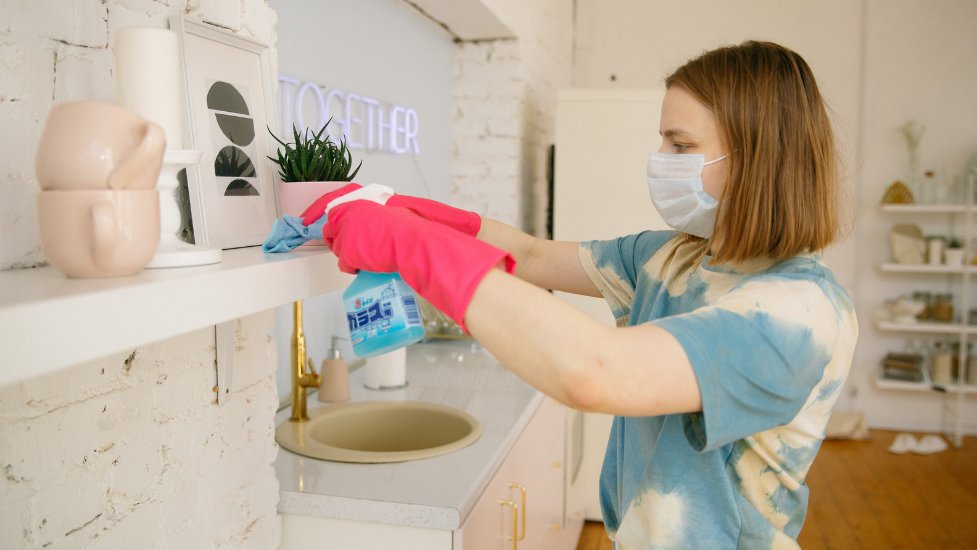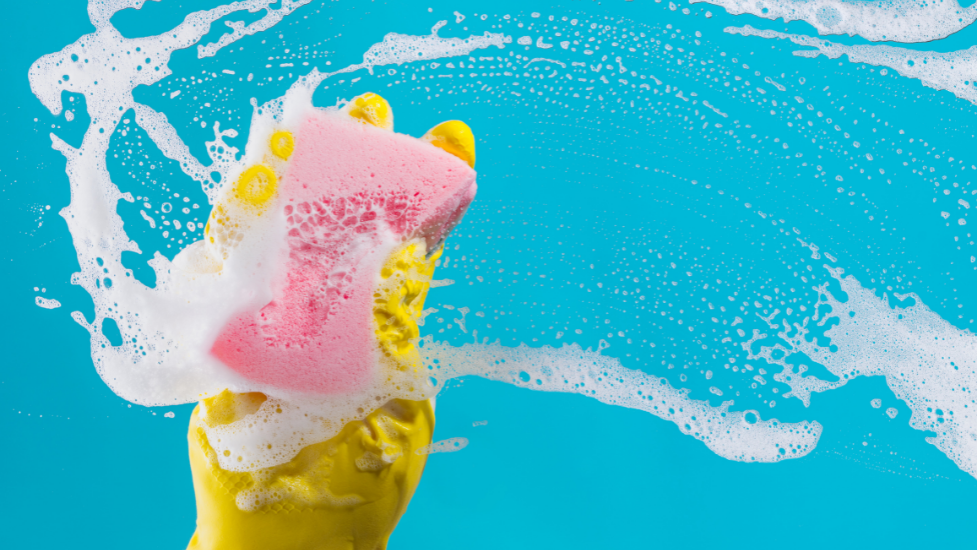Accommodation
Cleaning guide: Halls
Whilst living in halls it is important to keep your surroundings clean to prevent pest and avoid the spread of things like Covid, Freshers' Flu and Meningitis.
How to clean your bathroom
Shared bathrooms should be cleaned after each use to keep you and your flatmates as safe as possible. En-suite bathrooms are normally used by one individual and as they are not shared by others they should be cleaned at least twice a week.
If you follow these simple steps on a routine basis it will take no time at all to sanitise and keep your bathroom sparkling.
- Ensure the room is ventilated (open doors and/or windows) before using cleaning products.
- You will need a multi-surface disinfectant bathroom cleaner, bathroom sponge/scourer, cloth and toilet cleaner. You can purchase a good multi-surface disinfectant bathroom cleaner for around £1.50 and this should last you for around two months.
- It is recommended you wear gloves when cleaning/using products.
- Apply the multi-surface disinfectant bathroom cleaner to the sink, shower and scrub using the bathroom sponge/scourer.
- Apply toilet cleaner under the toilet rim and scrub the inside of the toilet using the toilet brush supplied.
Remember to store any chemicals in a cool, dark cupboard. Thoroughly wash all cloths to prevent cross-contamination or bacterial growth.
Warning – Please take care not to mix chemicals/products as this may result in toxic fumes which can be dangerous.
Wash your hands thoroughly for at least 20 seconds with soap and hot water after cleaning.

How to clean your kitchen
Fridge
As the fridge is used often it is recommended you clean the handles often. You will need to regularly throw away any rotten food (fruit/vegetables etc.) and wipe up any spillages. This will help to keep your fridge smelling fresh and prevent other food from spoiling. We recommend you store cooked meat above raw meat.
To prevent cross-contamination, keep foods covered using cling film or a sealed container. You should clean out the fridge every at least every two weeks to prevent bacteria and dirt build-up. Make sure you use food-safe products when cleaning inside the fridge.
Freezer
You will need to defrost your freezer before a thick layer of ice forms on the inside. This will usually be once a term, although your freezer may need defrosting more often. Please read our freezer operating instructions.
Keep your worktops clean and tidy, make sure after preparing and cooking food you wipe and spray the worktops with antibacterial spray.
Cooker and hob
You should use oven cleaner or a heavy-duty kitchen cleaner to clean the cooker and hob. Please ensure you clean the cooker and hob only when they are turned off and cooled down.
Please note that dried on food spills are a fire risk in addition to being used often so to protect you and your flatmates it is good practice to clean the cooker and hob (including handles and knobs) after every use.
Microwave oven
To clean the microwave, simply use a damp cloth to wipe the oven sides and plate. It is good practice to do this regularly to prevent stains and spills from becoming dried and more difficult to remove. If stains and marks do build up, use a food-safe antibacterial kitchen cleaner on your cloth. It is recommended to disinfect the microwave handle often for added protection.
Crockery and cutlery
Dirty dishes cause smells and can attract pests to your kitchen. They can also cause friction between you and your housemates. Wash dishes and crockery as you use them. You may find the kitchen cleaning rota which is supplied with each flat useful.
Floor
To protect you and your flatmates we recommend you wash your floor regularly with hot water and an antibacterial floor cleaner. If any spills occur, use a cloth/mop to wipe up any mess. Take care not to leave a wet floor unattended for health and safety reasons. Mops, buckets, and vacuum cleaners are provided for your use.

Topics
- Read Next
-
 5 tips on starting placement for healthcare students
5 tips on starting placement for healthcare students
 Tips and Tricks for Reading Academic Articles
Tips and Tricks for Reading Academic Articles
 Dealing with Culture Shock
Dealing with Culture Shock
 Food Hygiene in Halls
Food Hygiene in Halls
 Understanding the UK Healthcare System - An International Student's Guide
Understanding the UK Healthcare System - An International Student's Guide
 A guide to cooking at University
A guide to cooking at University
 Res Life Project Group Events
Res Life Project Group Events
 Res Life Podcast - Episode 2
Res Life Podcast - Episode 2
 Calling freshers from Hong Kong: how do you adapt to Cardiff life?
Calling freshers from Hong Kong: how do you adapt to Cardiff life?
 Navigating Cultural Shifts & Thriving as an International Student in the UK
Navigating Cultural Shifts & Thriving as an International Student in the UK
- Popular
-
 Talybont South student guide
Talybont South student guide
 How to...report a maintenance issue
How to...report a maintenance issue
 How to...laundry
How to...laundry
 What to bring to uni?
What to bring to uni?
 Catering in Residences
Catering in Residences
 Talybont North Student Guide
Talybont North Student Guide
 Running routes in Cardiff
Running routes in Cardiff
 Settling in FAQs
Settling in FAQs
 University Hall Student Guide
University Hall Student Guide
 Which Residence is Right For You?
Which Residence is Right For You?


